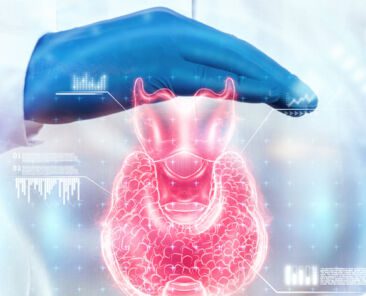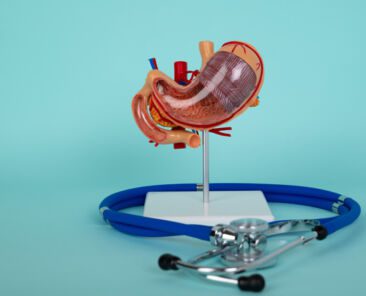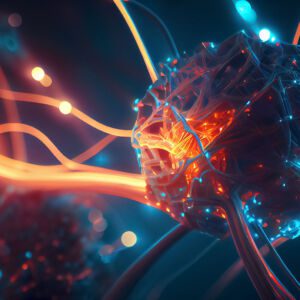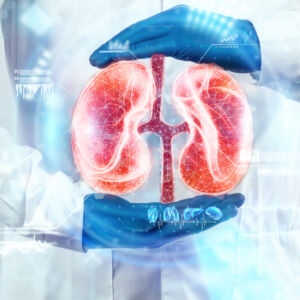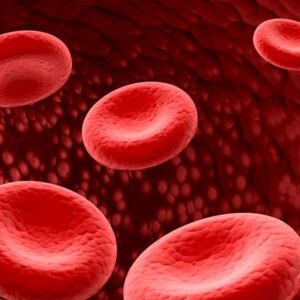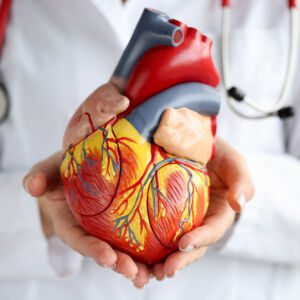Endocrinology (part of the Department of Endocrinology and Diabetology) is a medical speciality that deals with the body’s hormonal systems. The endocrine system is the network of glands and organs in the body that control various biological functions. This system releases hormones into the bloodstream, from where they travel to different parts of the body and affect their functions.
HORMONAL DISEASES
Treatment of disorders affecting the hormones secreted by various glands: pituitary, thyroid, adrenal, etc.
The term “hormonal disorders” refers to any disease caused by abnormal hormone production. Hormones are chemical messengers secreted by endocrine glands throughout the body. They control many processes in the body, including digestion, metabolism, growth and reproduction.
Hormonal disorders can be caused by over- or underproduction of a particular hormone or combination of hormones. Hormonal imbalances can cause a wide range of symptoms, including tiredness, weakness and weight gain or loss.

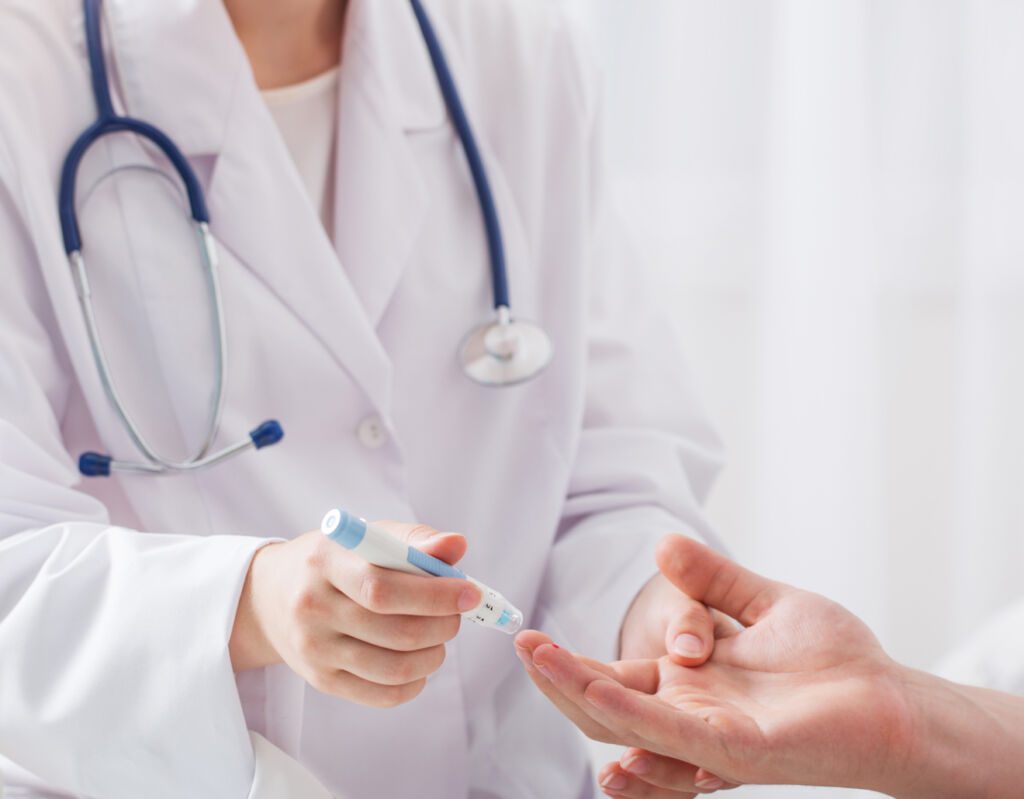
DIABETES TREATMENT
There are three main types of diabetes (treated in our Endocrinology and Diabetology department):
Our medical teams treat the different types of diabetes
– Diabetes Type 1, which often appears in childhood
– Gestational diabetes, which appears during pregnancy and often disappears after childbirth;
– Diabetes Type 2, the most common form of diabetes, which appears in adulthood.
Diabetes treatment aims to control blood glucose levels, prevent complications and improve quality of life. Diabetes treatment may include:
- A healthy diet that includes counting carbohydrates and regular physical activity
- Medication to control blood glucose levels, including insulin injections for people with type 1 diabetes
- Insulin therapy for people with type 2 diabetes who cannot control their blood glucose levels with diet and exercise alone.
THYROID DISEASES
Management of thyroid conditions such as growth disorders, hypothyroidism and hyperthyroidism.
Thyroid disorders are a diverse family of conditions that affect the thyroid gland and its hormones. The thyroid is a small, butterfly-shaped gland located in the front of the neck. It produces thyroid hormone, which controls the body’s use of energy, whether it is stored or burned.
The thyroid produces two main hormones: triiodothyronine (T3) and thyroxine (T4). These hormones circulate in the blood and reach all the body’s tissues. T3 and T4 regulate metabolism and growth, among other functions.
Thyroid disease (a condition treated in our Endocrinology and Diabetology department) can result from over- or under-activity of the thyroid gland (hyperthyroidism/hypothyroidism).
Thyroid hormone production may be excessive or insufficient, leading to symptoms such as weight changes, hair loss, constipation, muscle pain and weakness, heart palpitations, fatigue, high blood pressure, increased sweating, sensitivity to heat and cold, irritability and depression.
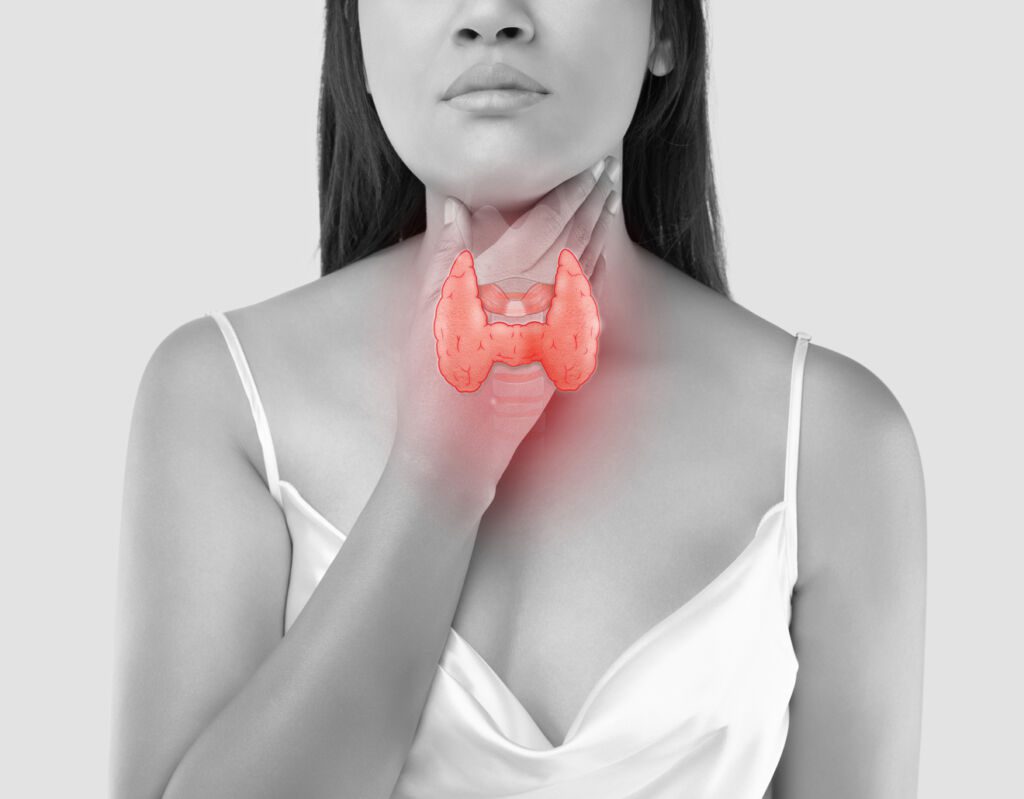

OBESITY
Obesity (treated in our Endocrinology and Diabetology department) is a pathological condition characterised by the accumulation of excess body fat to the point where it can have a negative impact on health. An obese person has a body mass index (BMI) – measured by weight in relation to height – of over 30 kg/m2.
Obesity can significantly increase the risk of many chronic diseases and conditions, including cardiovascular disease, type 2 diabetes mellitus, hypertension (high blood pressure) and osteoarthritis.
The most common medical treatment for obesity is bariatric surgery. A bariatric surgeon removes part of the stomach (sleeve gastrectomy) or bypasses the intestines (gastric bypass). Gastric banding is another option, but does not require general anaesthetic as gastric bypass does.
Bariatric surgery can help you lose about 30% of your excess weight within a year, depending on the procedure chosen and the amount of weight you want to lose.
WHAT IS DIABETIC FOOT?
The diabetic foot (treated in our Endocrinology and Diabetology Unit) is a serious, potentially life-threatening condition that can lead to amputation if left untreated. It occurs when small blood vessels in the foot are damaged or destroyed, which can lead to infection of the bone or tissue around the toes, heel and ankle.
Symptoms of diabetic foot include:
- Redness or swelling in the affected area.
- Pain in the foot, ankle or heel.
- Limping when walking.
- White patches on the toenails.
- Sensitivity to pressure in certain areas of the foot.
The term “diabetic foot” is used to describe a number of problems that can occur in the feet of people with diabetes. Some of these problems may include:
- Thickening of the skin (called diabetic dermopathy).
- Numbness and tingling.
- Calluses or corns.
- Skin ulcers that don’t heal.
WHAT IS GESTATIONAL DIABETES?
Gestational diabetes (treated in our Endocrinology and Diabetology department) is a type of diabetes that first appears during pregnancy. It is usually temporary, i.e. it disappears after the baby is born. But if you have gestational diabetes, you are more likely to develop type 2 diabetes later in life.
– What is gestational diabetes?
Gestational diabetes is a type of hyperglycemia (high blood glucose) that occurs in women who have never had diabetes before and who are not obese. Gestational diabetes usually disappears after the baby is born.
– What causes gestational diabetes?
The cause of gestational diabetes is unclear, but research suggests that hormones produced by the placenta may affect insulin production. Researchers are trying to understand the causes of these hormonal changes so that they can be prevented or treated with drugs or other therapies.
We present to you some articles relating to pathologies treated in our Mediterranean clinic, with an effective and efficient medical and paramedical team.
Turner syndrome is a genetic disorder that affects girls and women. It is caused by the presence of a complete or partial X chromosome (45, X) in each cell.
The main characteristics of Turner syndrome are short stature, a palmate neck, large breasts with widely spaced nipples and a low hairline at the back of the neck. Other characteristics include:
Most women with Turner syndrome have normal intelligence. They may have learning difficulties with maths and grammar.
Turner syndrome can affect the heart, kidneys, bones and other organs. It can also cause hearing loss, congenital heart disease, and other medical problems.
Treatment for Turner syndrome focuses on managing the complications associated with the condition. Some treatments may include medication or surgery.
Turner syndrome is often not diagnosed until the teenager is very small or has problems with their menstrual cycle.
Some people with Turner syndrome develop learning difficulties and social problems, but others do not. Most people with Turner syndrome are infertile and (impaired fecundity) cannot carry a child to term.
Scurvy is a disease caused by vitamin C deficiency. It is characterised by weakness, anaemia, spongy gums and bleeding under the skin and inside the body.
Vitamin C is needed for the formation of collagen, which plays an important role in wound healing. A person with scurvy has poorly healed wounds and may be extremely tired.
Scurvy was once a common problem among sailors who spent long periods at sea without fresh fruit and vegetables in their diet. Nowadays it is rare because most people have access to a diet that includes adequate amounts of vitamin C-rich foods.
Symptoms of scurvy include:
- Tiredness, lethargy and apathy;
- Pale skin;
- Gum disease, with swollen, sensitive gums that bleed easily;
- Loosening and loss of teeth;
- Muscle pain and weakness (myalgia);
- anaemia due to blood vessel damage.
Graves’ disease is an autoimmune disorder that occurs when the immune system attacks the thyroid gland, causing hyperthyroidism. Graves’ disease is one of the most common causes of hyperthyroidism.
Graves’ disease often starts with a goiter, an enlarged thyroid gland in the neck. The goiter is usually painless and may remain invisible for some time.
Symptoms of Graves’ disease:
The most common symptoms of Graves’ disease are:
- Weight loss despite increased appetite.
- Feeling hot all the time, even when others are cold.
- Tremors in the arms and legs (a tremor is a shaking movement).
- Anxiety or nervousness.
Cushing’s syndrome (hypercortisolism) is a syndrome caused by prolonged exposure to high levels of cortisol.
Cortisol is a hormone produced by the adrenal glands that, under normal conditions, helps regulate metabolism, blood pressure, immune function and body composition. It also counterbalances insulin and plays an important role in energy storage.
However, excess cortisol can lead to symptoms such as weight gain, increased blood pressure and diabetes.
Cushing’s syndrome is a condition in which the body produces too much of the hormone cortisol. Cushing’s syndrome can be endogenous or exogenous. Exogenous Cushing’s syndrome occurs when an external source causes the body to produce too much cortisol, whereas endogenous Cushing’s syndrome occurs when the body itself produces too much cortisol.
*Signs and symptoms of Cushing’s syndrome include:
- Weight gain: You may gain weight around your face, neck, back and abdomen.
- Hair loss: Your hair may become thin or fall out.
- Feeling tired or weak: You may feel more tired than usual and have less energy than before. This may prevent you from doing the things you enjoy, such as exercising or playing sports.
- Sleep problems: You may have trouble sleeping at night because you feel wide awake or have nightmares or bad dreams after falling asleep.
- Memory problems: You may have difficulty remembering things and concentrating on tasks such as reading or working on a computer. These problems can get worse over time as your condition worsens if they are not treated immediately!
The endocrine system is very important for the proper functioning of the body. However, sometimes hormones are disrupted and cause imbalances.
Considering the gastric band procedure for weight loss? This comprehensive guide covers everything you need to know about the surgery, risks and benefits.
You ask, our teams answer.
F.A.Q
Endocrinology is a branch of medicine that deals with hormones in the human body.
Endocrinology involves the study, diagnosis and treatment of diseases related to hormone dysfunction. Endocrinologists are doctors who specialise in treating patients with endocrine disorders such as diabetes mellitus, thyroid, adrenal and pituitary disorders.
The most common type of endocrinology is general endocrinology, which includes the treatment of diabetes mellitus and adrenal disorders, but there are many specialised types of endocrinology:
- Paediatric endocrinology – treating children with hormones
- Adult endocrinology – treating adults with hormones
- Reproductive endocrinology – treating people who have difficulty getting pregnant or who have fertility problems
- Thyroid disease – treating people with thyroid problems caused by over- or under-activity of the thyroid gland.
The adrenal glands, also known as the suprarenal glands, are endocrine glands located above the kidneys.
The adrenal glands produce hormones that play a role in many bodily functions, including metabolism, digestion and immune function.
The adrenal glands are made up of two different parts: the inner medulla and the outer cortex. The medulla produces epinephrine (adrenaline) and norepinephrine (noradrenaline). The cortex produces steroid hormones such as cortisol, aldosterone and dehydroepiandrosterone (DHEA).
The adrenal glands also produce hormones called corticotropin-releasing hormone (CRH) and arginine vasopressin (AVP). CRH is released from the hypothalamus into the anterior pituitary gland, where it stimulates the release of ACTH from the anterior pituitary into the bloodstream, where it affects the secretion of steroid hormones by the adrenal cortex. AVP is released into the bloodstream by neurons in the supraoptic nucleus of the hypothalamus, where it increases renal water retention by increasing the permeability to water reabsorption by distal tubule cells in the nephron loops of the renal glomerulus.
Diseases of the adrenal glands (treated in our Endocrinology and Diabetology department) fall into two categories: hyperactivity (overproduction) or under activity (underproduction) of the hormones produced by the adrenal glands. Most adrenal disorders are rare and occur in childhood or adolescence. Cancers of the adrenal gland are much less common than other type of cancer, but they are often diagnosed at an early stage because they can cause symptoms and can be detected during routine examinations or imaging tests performed for other reasons.
The pituitary gland is a pea-sized gland located at the base of the brain. It controls the hormones in your body.
The pituitary gland produces several important hormones, including the following
Growth hormone (GH): Growth hormone stimulates growth in children and teenagers. In adults, it helps to build strong cartilage and bones, maintain muscle mass and strength, regulate blood sugar levels and maintain normal blood pressure. If the pituitary gland doesn’t produce enough GH, you may have problems with height (short stature) or weight gain (stunted growth).
Prolactin: Prolactin stimulates breast development during pregnancy and milk production after birth.
Thyroid-stimulating hormone (TSH): TSH stimulates the thyroid gland to produce thyroid hormones (triiodothyronine [T3] and thyroxine [T4]).
Thyroid hormones help regulate metabolism (the rate at which our bodies convert food into energy) and play an important role in normal growth in children. Thyroid hormones also help maintain healthy nerve cells in the brain, which control thinking, memory, mood and other mental functions.
Diabetology is the branch of medicine concerned with the study, treatment and prevention of diabetes mellitus. It is also known as endocrinology. It is a specialty that focuses on the prevention, diagnosis and treatment of diabetes mellitus.
Diabetes mellitus is a group of metabolic diseases in which blood glucose levels are high over a long period of time. There are two main types of diabetes: diabetes type 1, sometimes called insulin-dependent diabetes mellitus (IDDM), and diabetes type 2, sometimes called non-insulin-dependent diabetes mellitus (NIDDM). The vast majority of people with diabetes have diabetes type 2.
In addition to regulating blood glucose levels, insulin also regulates protein and fat metabolism. Insulin receptors are found in skeletal muscle, adipose tissue, liver and heart muscle. The role of insulin resistance in the pathogenesis of cardiovascular disease has been debated for many years, but it appears to play a major role in both type 1 and type 2 diabetes.
The first-line treatment for both types of diabetes is diet and exercise. Oral medications can be used for long periods to help control blood glucose levels.
Diabetes Type 2 is a condition in which blood glucose levels are higher than normal. Glucose is the body’s main source of energy. In diabetes type 2, either the pancreas doesn’t produce enough insulin, or the cells don’t respond properly to insulin. As a result, glucose cannot enter the cells and builds up in the bloodstream.
Diabetes Type 2 used to be known as non-insulin-dependent diabetes mellitus (NIDDM) or adult-onset diabetes. It usually develops in people over the age of 40, although it can occur at any age. In fact, about 10% of children and adolescents have diabetes type 2.
Treatment consists of lifestyle changes, including a healthy diet, weight loss if necessary and physical activity most days of the week. Some people may also need medication to control their blood glucose levels.
The gonads are the primary sex organs of males and females. In males they are called testes and in females they are called ovaries. The gonads are responsible for the production of gametes (spermatozoa in males, ova in females).
In addition to their reproductive function, the gonads also secrete hormones into the bloodstream that influence body development, sexual characteristics and behaviour.
The male gonad is located in the scrotum, outside the abdomen. The female gonad is located on the upper outer surface of each kidney.
The term “gonads” is sometimes used to refer to the entire reproductive system, including the testes and ovaries.
Diseases of the gonads are treated in our Endocrinology and Diabetology department.



